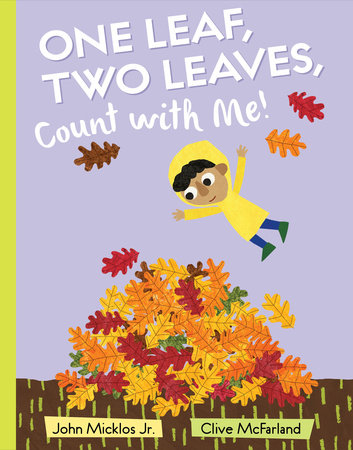This playful counting book shares the colorful highlights of the four seasons in charming illustrations.
Count your way through the seasons! In spring, the tree’s leaves appear, one by one. By summer, there’s a glorious canopy. And when autumn winds blow, leaves fly from the tree, one after another, leading us into winter. There’s a world of activity to spy in and around this beautiful tree as the wild creatures, and one little boy, celebrate the cycles of nature. As little ones count leaves, look for animals, and enjoy the changing seasonal landscape, bouncy rhymes and bold illustrations make learning to count easy—corresponding numerals reinforcing the learning fun.
On sale: September 5, 2017
Age: 1-3 years
Grade: Up to Preschool
Page count: 32 Pages
ISBN: 9780399544712
Reading level: Lexile: AD370L
John Micklos, Jr. (johnmickloswriter.com) is an award-winning education journalist and the author of more than twenty books for children and young adults. He compiled the poetry picture books
Daddy Poems,
Mommy Poems,
Grandparent Poems, and
No Boys Allowed: Poems About Brothers and Sisters. His nonfiction work includes books about the Lewis & Clark expedition, the 1918 flu pandemic, the Challenger disaster, the Alamo, the Pony Express; and a series about the Revolutionary War. He has spoken at the national conferences of the International Literacy Association and NCTE, as well as state conferences in New York, Pennsylvania, New Jersey, Maryland, and Delaware. He lives in Newark, Delaware.
Clive McFarland (clivemcfarland.com) wrote and illustrated
The Fox and the Wild and
A Bed for Bear, a Kids’ Indie Next List Top Ten. He grew up in Northern Ireland and studied at Liverpool School of Art and Design. He lives in Omagh, North Ireland, United Kingdom.
Twitter: @CliveMcF Instagram: clivemcf Facebook: @CliveMcF
* “This cleverly structured narrative tracks the progression of the seasons, honoring the mathematical structure underlying the yearly cycle. The text counts the leaves appearing on a tree over the course of spring, counts back down as the leaves drop off in the autumn, and circles back around to the following spring when the count begins anew. Micklos’s concise rhyming verse employs an impressive economy of language, which is bolstered by McFarland’s bright, textured collage-style art. A first purchase with important connections to early mathematical learning and natural science.” —
School Library Journal, starred review (board book edition)
“A counting book that doubles as an introduction to the seasons. . . . In addition to highlighting how the tree changes, McFarland’s grainy mixed-media graphics reveal a revolving assortment of animals, including a steadfast squirrel that appears in each scene. Micklos’s punchy rhymes and McFarland’s bold artwork create a breezy counting tale that encourages readers to observe subtle changes in the world around them.”—
Publishers Weekly
“Micklos’ bouncy rhyming verses keep the pages turning as the seasons change and leaves unfurl or fall, numerals sharing the pages with the text to reinforce the counting. . . . McFarland's crayon, watercolor, acrylic, and digital illustrations are angular and graphic. . . . Full- and double-page spreads, vignettes, changes in perspective, and scenes showing the tree as it gains/loses leaves combine with the clues signaling the seasons' changing and the different animal visitors to keep readers' interest. . . . A solid look at both counting and seasonal changes.”—
Kirkus Reviews
“Young children will enjoy the bouncy rhyming text while learning about counting, numbers, and the seasons. Numbers are included with each illustration, both in the text and with large numerals; and the leaves are counted forward to 10 through summer and then backward as the leaves turn colors and fall from the tree. The images include details that children will enjoy. . . . The graphic watercolor illustrations use soft colors and simple shapes to depict different elements of nature. . . . This concept book effectively combines both counting and the seasons, and will be well received by young children.”—
School Library Journal














